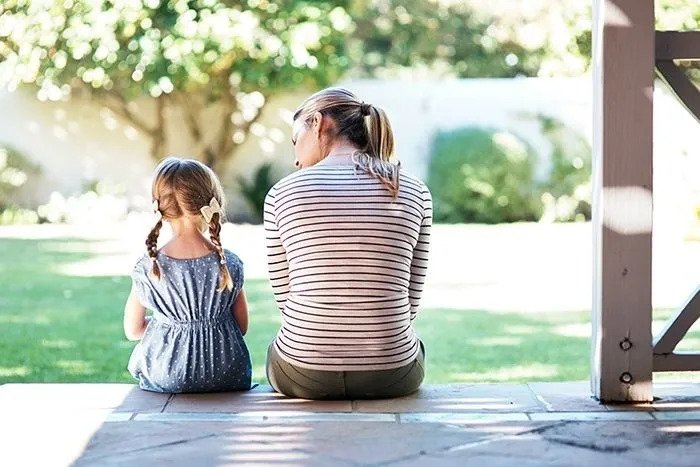A Guide for Parents and Caregivers
Introduction
Discussing an ovarian cancer diagnosis with others can be daunting. Who do you tell? What do you say? Are you even ready to discuss your diagnosis with others? These questions and more may arise in your mind as you plan to tell others. In our article, “Breaking the News: How to Tell Others About Your Ovarian Cancer Diagnosis” we provided tips for discussing your diagnosis with adults. As a parent or caregiver, you may feel overwhelmed at the thought of explaining cancer to children. In this article, we hope to ease your fears and provide tips for speaking with children of different ages about cancer.
Special Communication Needs for Children of Different Age Groups
As adults, we understand children of various age groups absorb and understand information differently. Very young children may need simplistic language and physical closeness to an adult, whereas older children and teenagers may need straightforward language and alone time to process. Ultimately, you, as the parent or caregiver, know the needs of your child/children better than anyone. How you choose to move through the discussion is a private choice; we have compiled some tips to help you decide how best to discuss your ovarian cancer with them.
Very Young Children (toddler through preschool age)
- Choose a time when both you and your child feel well and calm. You can tell them in a series of short discussions rather than all at once. Only you can assess your child’s capacity for information.
- Keep them physically close to you or your partner – sit them on your lap, or cuddle with them to tell your story.
- Tell them about Cancer and what it means to them – try to avoid calling it sickness or illness, as a child may think anyone sick or ill has cancer.
- Explain treatments you may need and reassure them when you leave for an appointment, you will return.
- To help them cope, do your best to keep a familiar daily routine.
- You might want to use a stuffed animal or a visual aid, like a book about cancer, to help them grasp the information.
- Most importantly, cuddle, hug, and love them as often as possible. This will not only help them cope but will also help you.
School-age and Pre-Adolescent Children
- Be honest and use the proper words. Children of this age can understand abstract concepts better than younger children.
- Choose a time and place where your child feels safe and happy for the discussion. The comfort of loved surroundings may help soften the shock.
- Be prepared for strong emotional responses. Some children may become angry and act out, they may cry, and others may withdraw. Reinforce their feelings are normal and ok to talk about with you or another trusted adult.
- Make sure to tell them cancer is not contagious.
- Explain the course of treatment; chemotherapy, radiation therapy, surgery, etc.
- This age group has the capacity to understand a terminal illness and may ask about death early on in the discussion.
- It is OK to say, “I don’t know.” in the face of difficult questions about the outcomes of ovarian cancer.
- Some children may ask to come to appointments with you or see your treatments. This is a personal choice; there is no right or wrong answer. You may want to be prepared with a response if your child requests this.
- Share information in doses your child can handle. Some children may want to talk it through thoroughly, while others may need to process and revisit the topic at a later time.
- Allow your child to tell you or others about their feelings. Children process differently and may want to talk to others about ovarian cancer.
- Understand the reactions of your child are not a reflection of you or their love for you. Your child loves you and may struggle with thoughts/fears of the future.
Teens
- Tell your teen as soon as possible when a diagnosis of ovarian cancer is confirmed. Teens are intuitive and will sense something is wrong.
- Be as detailed in your discussion as it makes you comfortable. Teens may have probing questions and want to understand everything from your first symptoms through your treatments.
- When teens experience intense emotions, they may withdraw and want to spend more time with friends or outside of the home. Diversion with outside activities may help teens cope. Try to understand this need is not a reflection of you or their love for you.
- Be prepared for your teen to experience the stages of grief after learning of your ovarian cancer diagnosis. This age group has the ability to think in past, current, and future terms. A grief response is expected.
- Involve your teen as much as they can handle. Open and honest communication may help build a deeper relationship with them, one that you both may cherish.
- Watch your teen for signs of depression, anxiety, fear, or other troublesome emotions. If these symptoms concern you, reach out to medical professionals to help your teen cope.
No matter the age, telling your child about ovarian cancer is difficult. However, it can also be an experience that builds your relationship. Remember, this is your personal journey, and only you can decide what is best for you and your children. For more information about discussing ovarian cancer and other types of cancer diagnoses with children, visit the American Cancer Society or your local Cancer Center for resources.
Work with NurseWritersGroup to create credible content that positively affects the lives of your target audience; please drop us a note!




